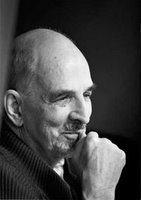skip to main |
skip to sidebar
 I continue with my two part series on movie directors, which makes me think i should go for a third part too. I shall explain later why...for now its...
I continue with my two part series on movie directors, which makes me think i should go for a third part too. I shall explain later why...for now its...
Ingmar Bergman, Swedish stage director and film-maker, famous for landmark movies like 'The Seventh Seal', 'Persona' amongst others. If Keislowsky was the most unique mind in the history of movies, Bergman was the most philosophical of the film-makers. While the essence of Keislowsky movies were always different and unique, Bergman's was mostly about the basic questions of life (God/Existentialism/Love as the answer to all problems) through different plots. Its like the difference between a Graham Greene (Keislowsky of literature) and Sartre (Bergman). Once again I would like to demostrate what I am trying to say by taking a few examples:
The Seventh Seal (1957)
Much has been said about this landmark movie. Man takes on Death in a game of chess and whoever wins, wins (but we, the viewers know that it has to be the 'Death' as that has been the ritual since forever). During this game of chess, some of the most existential of the conversations keeps happening between the two in the simplest of the language (which was a regular Bergmans' fixture). Take this for example,
Death: Don't you ever stop asking?
Antonius Block (Man): No. I never stop.
Death: But you're not getting an answer.
or,
Antonius Block: Who are you?
Death: I am Death.
Antonius Block: Have you come for me?
Death: I have long walked by your side.
Antonius Block: So I have noticed.
Death: Are you ready?
Antonius Block: My body is ready, but I am not.
Need I say anything more...Through a Glass, Darkly (1961)
The phrase, "... through a glass darkly..." first appears in the writings of the Apostle Paul. "To see "through a glass" - a mirror - "darkly" is to have an obscure or imperfect vision of reality. Paul explains that we do not now see clearly, but at the end of time, we will do so.
On a breezy islnd, a recently released mentally sick young woman, is spending her vacation with her husband , a doctor, her father, a writer and her younger brother. Karin is suffering from hallucinations and hysteria. She thinks she is visited by God. And the father, being a compulsive writer, starts recording the fall of his daughter as a subject material for his next work.
Where the movie becomes a brilliant philosophical study in celluloid, is in the last 5 minutes of conversation between the writer father and son, wherein the father (read Bergman himself) tries to suggest that 'love is probably the only way to carry on in this otherwise meaningless life with 'no concrete sign of God'.
trust me fellows, you would need whisky shots for Bergman!
now for the reason behind thinking about a third part to this series on directors. if you have noticed, there is a trend of 'Trilogy' amongst the great artistes (specially in movies)...some examples:
- Keislowsky with his 'Color Trilogy' (Red, Blue and White)
- Bergman with his 'Through a glass, Darkly', 'Winter Light' and 'The Silence'
- Satyajit ray with his 'Apu Trilogy'
- Godfather, Matrix etc
- Jean Paul Sartre with his 'Roads to Freedom' trilogy (Age of Reason, The Reprieve and Iron in the Soul)
- The Cairo Trilogy by Naguib Mahfouz
and many more...this 'Trilogy' phenomena is indeed a point to ponder!
 for those who dont know me much or havent paid attention to my profile, i am currently recovering from a slipped disc. i was on bed-rest/house arrest for 2 weeks. to preserve my sanity under such circumstances i took the aid of my DVD player and nearby 'dial-a-wine' shop. most of my waking hours of those 2 weeks was spent between sips of 'white' and watching world cinema by some of the great auteurs of modern times. let me examine 3 of my favorites.
for those who dont know me much or havent paid attention to my profile, i am currently recovering from a slipped disc. i was on bed-rest/house arrest for 2 weeks. to preserve my sanity under such circumstances i took the aid of my DVD player and nearby 'dial-a-wine' shop. most of my waking hours of those 2 weeks was spent between sips of 'white' and watching world cinema by some of the great auteurs of modern times. let me examine 3 of my favorites.
Krzysztof Kieślowski, the first one is the late polish director and the man behind 'Color trilogy', 'Decalogue' amongst other greats.
he was probably one of the most unique minds in the history of movie-making. this view of mine comes purely from the subjects/ideas he chose for his films (i am not even mentioning the art of movie-making here). let me try to illustrate this with a few examples:
No End (1984) : the film opens on the close-up of a man saying that he died two days ago and one starts to think about films like 'ghost' (from hollywood) and 'truly madly deeply (from UK) and realizes brain behind this big idea - a dead man moving around to see and hear the grieving people he has left behind...totally unique!
Blind Chance (1981) : this one is on the various 'what ifs' we all keep facing throughout without realizing it most of the time. it begins with a young man trying to catch a moving train. the rest of the movie (well...actually 3 movies) unfold depending on wether he catches the train or not and the following set of circumstances he gets into. the detailing of the all the three films is impeccable. and yes, you guessed it right this movie inspired the recent experimental hit, 'run lola run'.
Camera Buff (1979): an ordinary family man turns into an acclaimed and obsessive movie-maker and it all began with buying a movie-camera to shoot the growing up of his daughter. a film-making project from the company he works for gets him interested in the art of movie-making and he realizes his calling. in the process he gets distanced from his family (the very first reason he got the camera for), but he doesnt mind it. took me back to 'moon and the six pence' by somerset maughum, the book based on the life of the famous painter, 'gaugin'. the film also has autobiographical shades.
i havent yet begun talking about '3 colors' or 'decalogue'...maybe sometime later. my next posting will be about the other director i mentioned earlier. in the meantime, try watching something by 'keislowsky'...you will enjoy it. and dont forget to add some white wine to the experience...it works beautifully!
 on my way to office i was flipping through today's newspaper and i saw an ad which made me feel a little bad about my profession. something akin, to the way you feel after youve chewed on the pip while having the orange. let me describe the ad to you:
on my way to office i was flipping through today's newspaper and i saw an ad which made me feel a little bad about my profession. something akin, to the way you feel after youve chewed on the pip while having the orange. let me describe the ad to you:
it was an exchange offer ad for Maruti Baleno:
Copy: 'Exchange your old car for a brand new Baleno' (so far, so good)
Visual: (now this is where the 'leaves a bad taste' part comes in: its the often used 'before / after' visual technique. its just that the visual for 'before' is an 'sad-looking old man' and the one for after is a 'young dude-looking man'.
okay...i get the point immediately and the agency's (topmost in the country) job is done....client's happy. but then, there is something called sensitivity/sensibility/good sense. what i got appalled at is the blatant implication of the message (purely from the used visuals): 'get rid of old stuff from your life, for instance elederly people'. not the best thing to come out from an almost heritage brand belonging to a country where we are taught to respect elders, right from our childhood.
being a sensitive person, perhaps i am exaggerating things a bit....please convince me that i am.
 because good ol' zimmy inspired the blogname, i shall baptise the blog with my views on 'modern times', his latest album. much has already been written in the media about the album and its climbng up the charts beating the likes of beyonce et al.
because good ol' zimmy inspired the blogname, i shall baptise the blog with my views on 'modern times', his latest album. much has already been written in the media about the album and its climbng up the charts beating the likes of beyonce et al.
musically, he experiments beautifully with varied genres like pre-rock 'n' roll, country blues and swingtime jazz. and you get all this lace with his whiskey-wisdom soaked voice. lyrically, he fills it up with wittily self-depreciative asides ('my mind tied up in knots, i keep recycling the same old thoughts'), heartfelt love poems and (most surprising of all) harsh political critique (couched as ever in Biblical terminology) on the grand finale, ''ain't talkin' - dylan's 44th album is much more than i had expected from this 65-year old genius.
the worrying musings on mortality have given way to a frankly peppy acceptance of his place in the world. he even name-checks alicia keys (i was thinkin' 'bout alicia keys, couldn't keep from crying when she was born in hell's kitchen, i was living down the line)
some words from my personal favorite, 'aint talking' (with the shades of 'highlands' from 'time out of mind'). look-out for the usage, 'toothache in my heel'...only a dylan can do it!
All my loyal and my much-loved companions
They approve of me and share my code
I practice a faith that's been long abandoned
Ain't no altars on this long and lonesome road
Ain't talkin', just walkin'
My mule is sick, my horse is blind.
Heart burnin', still yearnin'
Thinkin' 'bout that gal I left behind.
Well, it's bright in the heavens and the wheels are flyin'
Fame and honor never seem to fade
The fire gone out but the light is never dyin'
Who says I can't get heavenly aid?
Ain't talkin', just walkin'
Carryin' a dead man's shield
Heart burnin', still yearnin'
Walkin' with a toothache in my heel
some trivia on the album:
- dylan is currently featured in an iPod commercial, seen performing "someday baby" from the album
- a short film starring scarlett johansson and set to dylan's new song "when the deal goes down" premiered on AOL and was released online and to video channels last thursday. directed by academy award nominee bennett miller (capote), the film was shot on 8mm and takes place in the early 1960s. clues connecting the film's scenes to dylan's early career are creatively placed throughout the piece.
- the album is self-produced under the pseudonym Jack Frost (cute!!!)
 I continue with my two part series on movie directors, which makes me think i should go for a third part too. I shall explain later why...for now its...
I continue with my two part series on movie directors, which makes me think i should go for a third part too. I shall explain later why...for now its...


